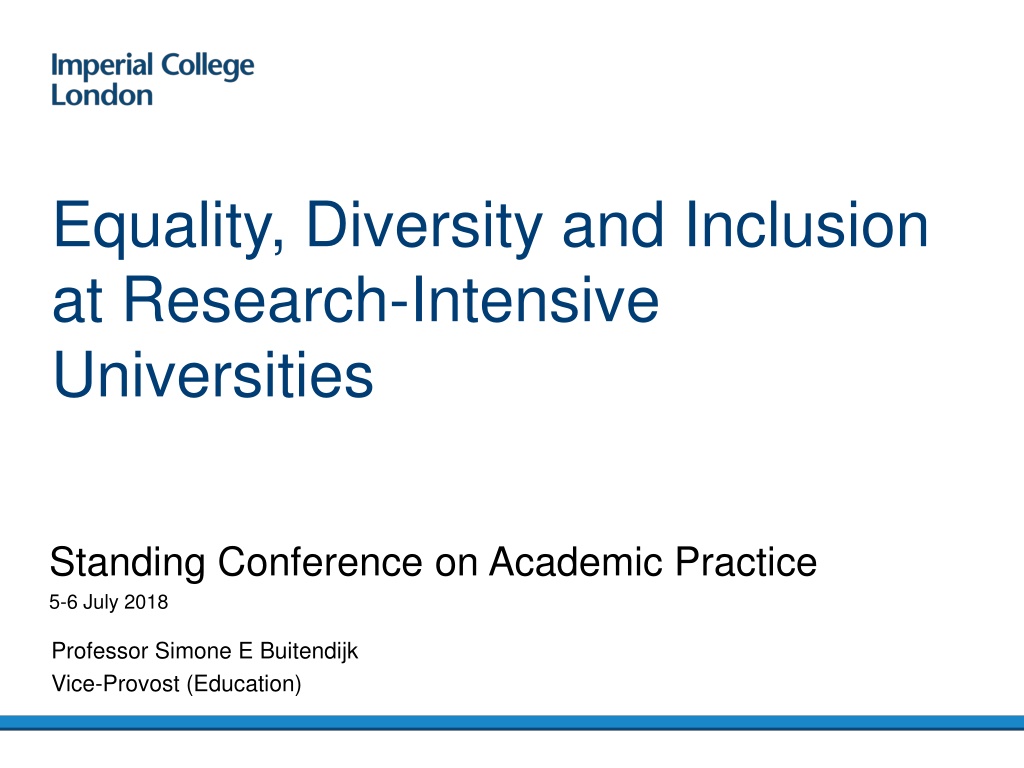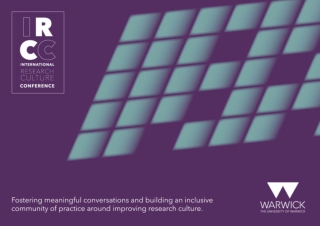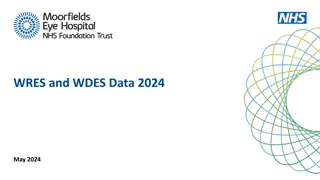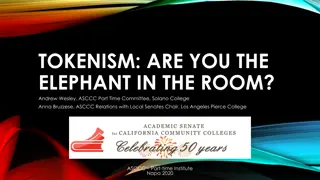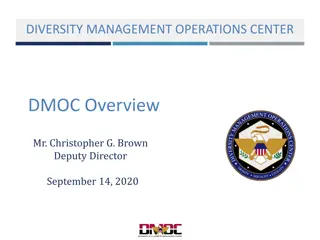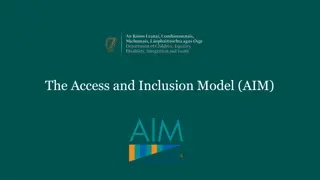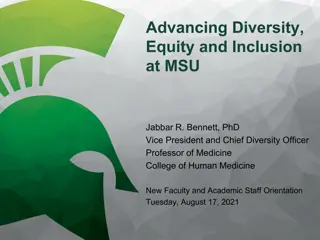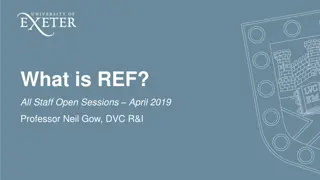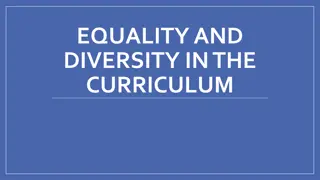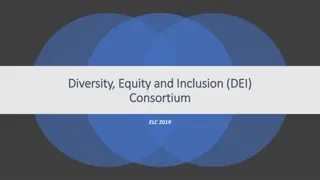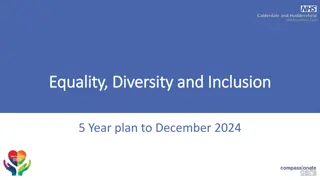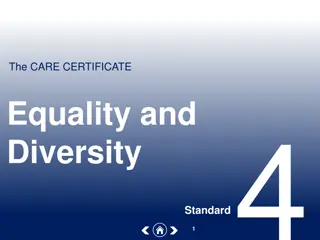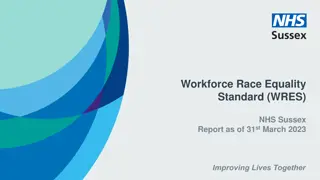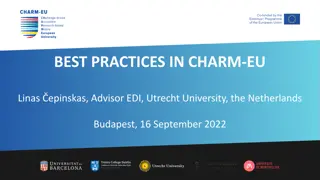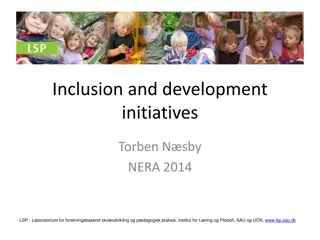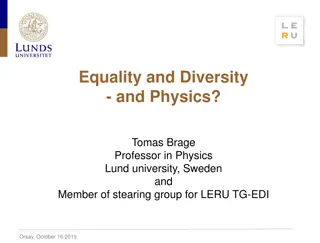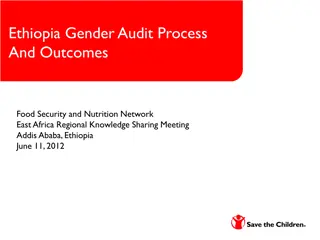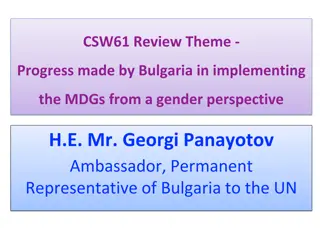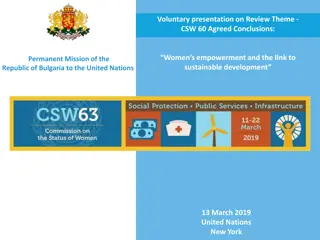Promoting Equality, Diversity, and Inclusion in Research-Intensive Universities
Research-intensive universities need to address issues such as a lack of diversity in staff and students, biases affecting success rates, and the need for a strategic system-wide approach to combat inherent problems. Recognizing these challenges and implementing collaborative, evidence-based strategies can lead to a more inclusive and impactful academic environment.
Download Presentation

Please find below an Image/Link to download the presentation.
The content on the website is provided AS IS for your information and personal use only. It may not be sold, licensed, or shared on other websites without obtaining consent from the author. Download presentation by click this link. If you encounter any issues during the download, it is possible that the publisher has removed the file from their server.
E N D
Presentation Transcript
Equality, Diversity and Inclusion at Research-Intensive Universities Standing Conference on Academic Practice 5-6 July 2018 Professor Simone E Buitendijk Vice-Provost (Education)
Why do universities need to act? waste of talent less satisfaction and success in staff and student body diminished societal and global impact
Some statistics 20-25% female profs (fewer in STEM) BME students less access and worse results LGBT students more mental health issues female engineering students less successful in projects enterprise/start-ups fewer women
Key issues highly competitive, up or out culture culture based on recognition of excellence pervasive bias -- at odds with meritocracy
What university leaders tell their young researchers is important: team work and collaboration multidisciplinary work societal impact teaching
What the system actually teaches them: be highly competitive focus on your own cv in terms of grants, publications and authorship avoid multidisciplinary work societal impact is not that important teaching does not really count
What approach do we need? system strategic evidence-based comprehensive collaborative
Why system approach? move away from the rhetoric of blame on individuals if system is flawed good people may be doing the wrong thing bias in the system is the main problem: myth of meritocracy cycle can only be broken by fixing the system first
Why strategic approach? problems are very engrained, cultural and complex combating wide-spread bias needs a strategic approach change management and targeted interventions are needed strategic analysis of system o statistics o goals o detailed, comprehensive plans
Why evidence-based? enormous amount of rigorous data on (gender) inequality available not waste effort and energy if not done well, interventions can back-fire carry out post-implementation analysis, to add to existing body of knowledge and to do it right within own institutions
Why comprehensive? gender ethnicity culture/background sexual orientation disability intersectionality
Why comprehensive? culture research content staff students
Climate change women disproportionately affected women and girls more often responsible for water gathering women and girls suffer more in times of food shortage majority of poor farmers are women women are more likely to die in floods women are important agents of change
Nationality bias in publications and citations: rich countries are viewed as producing better research (Harris et al, 2017)
Why comprehensive? admissions retention curriculum content role models mental health grades graduate success selection promotions awards grants visible roles leadership positions publications research content curriculum content institutional privilege
Why collaborative? We can t do it alone University networks o Joint strategies/toolkits o comparisons/evaluation/research/support Funders Publishers Policy makers (Athena Swan/DFG/EU) Head-hunters Business Other stakeholders (local communities/charitable foundations)
dsfds Utrecht, Netherlands;email: N.ellemers@uu.nl, 2018. 69:275 98 Annual Review of Psychology,Gender Stereotypes, Naomi Ellemers, Faculty of Social Sciences, Utrecht University, 3508 TC Job Attitudes and Performance during Three Career Stages. JOHN W. SLOCUM, JR., AND WILLIAM L. CRON. Journal of Vocational Behavior 26, 126-145 (198.5) Role models in career development: New directions for theory and research Donald E. Gibson. Journal of Vocational Behavior 65 (2004) 134 156 Gender in the Global Research Landscape, Analysis of research performance through a gender lens across 20 years, 12 geographies, and 27 subject areas. Elsevier, 2017 https://www.elsevier.com/research-intelligence/resource- library/gender-report From Malawi to Middlesex: the case of the Arbutus Drill Cover System as an example of the cost-saving potential of frugal innovations for the UK NHS Matthew Prime, Ibtehal Attaelmanan, Arjuna Imbuldeniya,Matthew Harris, Ara Darzi, Yasser Bhatti. BMJ Innovations Publish Ahead of Print, published on March 30, 2018 as doi:10.1136/bmjinnov-2017-000233 Does a research article s country of origin affect perception of its quality and relevance? A national trial of US public health researchers M Harris, J Macinko, G Jimenez, M Mahfoud, C Anderson. BMJ Open 2015;5:e008993. doi:10.1136/bmjopen-2015- 008993 They hear Africa and they think that there can t be any good services perceived context in cross-national learning: a qualitative study of the barriers to Reverse Innovation Matthew Harris, Emily Weisberger, Diana Silver and James Macinko. Globalization and Health (2015) 11:45 DOI 10.1186/s12992-015-0130-z Explicit Bias Toward High-Income- Country Research: A Randomized, Blinded, Crossover Experiment Of English Clinicians, Matthew Harris, Joachim Marti, Hillary Watt, Yasser Bhatti, James Macinko, and Ara W. Darzi. Health Affairs November 2017 36:1 1 Low-cost innovation in healthcare: what you find depends on where you look. Matthew Harris, Yasser Bhatti, Matt Prime Jacqueline del Castillo and Greg Parston. https://doi.org/10.1177/0141076817738501 Do International Health Partnerships contribute to reverse innovation? a mixed methods study of THET-supported partnerships in the UK. Kavian Kulasabanathan, Hamdi Issa, Yasser Bhatti, Matthew Prime, Jacqueline del Castillo, Ara Darzi and Matthew Harris. Kulasabanathan et al. Globalization and Health (2017) 13:25. DOI 10.1186/s12992-017-0248-2
dsfds Diana Silver, Viva Dadwal and James Macinko. Harris et al. Globalization and Health (2016) 12:36. DOI 10.1186/s12992-016- 0175-7 That s not how the learning works the paradox of Reverse Innovation: a qualitative study. Matthew Harris, Emily Weisberger, Gender, Work Time, and Care Responsibilities Among Faculty. Joya Misra, Jennifer Hickes Lundquist and Abby Templer Source: Sociological Forum, Vol. 27, No. 2 (JUNE 2012), pp. 300-323. Wiley. http://www.jstor.org/stable/23262110 Resisting resistance: Counter-resistance, consent and compliance in a consultancy firm. Dan K rreman and Mats Alvesson. The Tavistock Institute, DOI: 10.1177/0018726709334880 Volume 62(8): 1115 1144 Implicit bias in academia: A challenge to the meritocratic principle and to women s careers And what to do about it. LERU Advice Paper no.23 - January 2018. Prof. Jadranka Gvozdanovic, University of Heidelberg; Dr Katrien Maes, LERU. Limits to meritocracy? Gender in academic recruitment and promotion processes Mathias W. Nielsen. OUP Science and Public Policy, 43(3), 2016, 386 399 doi: 10.1093/scipol/scv052 Advance Access Publication Date: 28 August 2015 Engaging Gatekeepers, Optimizing Decision Making, and Mitigating Bias: Design Specifications for Systemic Diversity Interventions. Claartje J. Vinkenburg. The Journal of Applied Behavioral Science 2017, Vol. 53(2) 212 234 Science of science. S. Fortunato et al., Science 359, eaao0185 (2018). DOI: 10.1126/science.aao0185 Excellent education in research-rich universities. January 2018. Prof. Dilly Fung, Prof. Juliane Besters-Dilger, Prof. Rob van der Vaart, February 2017
Gender stereotypes and gendered expectations Naomi Ellemers, Utrecht University, Gender Stereotypes, Annual Review of Psychology 2018 69.275-98
The Global Risks Landscape World Economic Forum Global Risks Perception Survey 2017-2018
